Before we begin, it should be said that this article is not intended to be highly technical or overly detail oriented. If you are looking for very specific technical information, there are dozens of great resources out there regarding generators. However, If you are looking for suggestions from someone, kind of like a personal friend, who is experienced, has done 40+ hours of research and lives the fulltime RV lifestyle with a generator, read on.
If you want to skip straight to the 4 inverter generators we recommend, click here.
The Right Generator for the Job
Whether you are a “weekend warrior”, a full time RVer in general, or a singer/songwriter who is looking to disconnect and travel while producing music, you are going to need the right generator for the job.
Not every generator is built the same or provides the same type of power.
What is typically coined as a “construction generator” (a normal generator that is extremely loud) is intended for job sites where they need electricity to power their drills, saws and other tools. Usually it is the “weekend warrior” who is using this type of generator because it is what they happen to have on hand and will only be out camping for a couple of days.
Among the full time RVing community however, using this type of generator is almost seen as being “rude” (because they are so loud, disturbing the peace and tranquility of the nature we are all trying to enjoy) as well as not being a very practical option due to the type of electricity they generate.
If you are a singer/songwriter (or fulltime RVer for that matter), this type of generator would not only be so loud that it would ruin your recording, but the type of electricity it generates would distort and potential destroy all of your sensitive equipment.
So let’s discuss this educational part super quick and talk about what type of generator you SHOULD have:
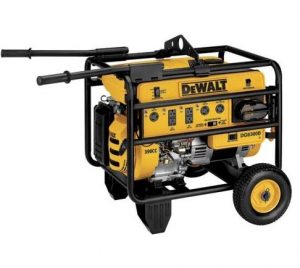
Normal “construction” generator
This type of generator is extremely loud, and must operate at a consistent RPM (meaning it will run at a fairly high speed the entire time) in order to generate the proper power you would need for electrical devices.
Any type of device that you want to power, which has any kind of microprocessor (phone, TV, computer, DVD player, etc.) can operate incorrectly or even be potentially damaged due to the fluctuating frequency of the energy this type of generator produces.
If you are going to be a fulltime RVer, or care about your electronic devices, don’t buy this one.
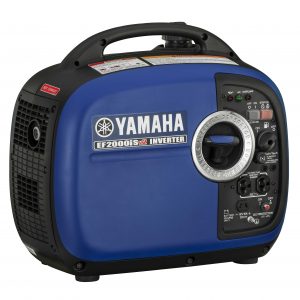
Inverter Generator
This type of generator has a more efficient and sophisticated design.
In a nutshell, the electricity it produces is converted from AC to DC and then inverts the power back to AC (what you need for any normal house/devices) in a regulated format called PURE SINE WAVE.
This is a fancy way of saying it will give you “clean” electricity which will not blow up your stuff.
Another great aspect of inverter generators is that they typically have whats called an ‘economy mode’. What this does is it allows the generator to “sense” how much electricity is being requested by your RV/devices and will only run as hard, and as loud, as it has to in order to provide enough power.
Instead of like a normal generator running at 3600 RPM all day, an inverter generator can run at a much lower RPM when a lot of power is not required (just powering a laptop and charging some phones) and then, automatically, will run at higher RPM’s when you need more electricity (turn on more computers, run the microwave or a blender, etc.). In addition to being much quieter you will also save on gas! Normal generators can go through many gallons of gas in a day, whereas a good inverter generator can go 6-10 hours on 1 gallon depending on use. During our work week, Audrey and I can use our inverter generator from the moment we wake up until we go to bed and we use roughly $65 a month in gasoline. That is cheaper than a normal house electric bill by far!
There is much more that can be said about the technology and tech specifics, but that is not the point of this article. If you want to know more details, you can Google/Youtube this information very easily or you can ask questions below in the comments and I will provide answers.
In terms of what ‘size’ of generator you should get (how many watts it can produce), this is a very difficult thing to answer as each person will have different usage needs and a different scenario. Having said that, we use 2 computers, TV’s and every normal electrical device needed in normal life on a daily basis. If you were to copy our lifestyle, which contains a large amount of what’s called boondocking (living out in nature on your own power/water/septic) then you will simply want to purchase a generator that produces 2000 watts.
Here is why…
A 2000 watt inverter generator is:
![]() Lightweight/Portable
Lightweight/Portable
When bookdocking, you need to grab your generator and set it up each time. Also, at night, you may want to bring it inside when you go to bed so that someone doesn’t steal it or so that it doesn’t get rained on and in the morning you will need to set it up again. All this moving of the generator would be a serious hassle if it weighed too much. Most, if not all 2000 watt inverter generators are small and even have a handle on them or some way to easily transport them. Larger generators would be too large and cumbersome for some people to deal with on a regular basis.
![]() Easy/Cheap to maintain
Easy/Cheap to maintain
You can take your generator to a service station if you WANT, but you don’t have to be handy or a mechanic to do the maintenance on these 2000 watt inverter generators. The user manual explains everything and the process is very straightforward. Unscrew a couple things, empty the oil, put some new oil in it and you are good to go. Replace a spark plug from time to time and that’s mostly the extent of it. Since they are small, everything is easily accessible. The amount of oil you need to put into these generators is also very small, so the cost is a non-issue.
![]() Efficient
Efficient
2000 watt inverter generators, in general, are extremely efficient. On average they will go 6-10 hours on a single tank. Larger generators will, of course, use more gasoline.
![]() Quiet
Quiet
When you are out in nature, recording a song or just don’t want to be bothered by the constant droning of a generator, the smaller the better. Larger generators make such a racket and even if you aren’t trying to record a song, it can wear on you after a while. What we do is put our generator about 20 feet away, in an area that won’t disturb our neighbors but that would also have a harder time penetrating into the RV. Audrey is constantly doing gigs for clients or recording her own music and it has never been an issue.
![]() More Than Enough Power
More Than Enough Power
You might think to yourself, “ya, but what if I want to run my air conditioner?”
The reality of the lifestyle we live is that we (and most fulltime RVers) follow the weather.
Wherever it is 60-80 degrees, is where we are going to be. Could you purchase a 3000-5000 watt generator and run your air conditioner? Sure, but why would you want to stay in a place that is miserably hot and why would you want to run your generator that hard, for that long, wasting so much gas?
The reality of the situation is that you simply do not need a generator larger than 2000 watts because you will naturally follow the weather because you will WANT to, not because you have to.
I could go on and on about this, but just know that this is fairly universal among fulltime RVers. Even when someone has a huge generator and/or a huge solar power setup, they would rather not have to use it for the AC since it is so inefficient and puts so much wear and tear on the equipment.
With a 2000 watt generator, Audrey and I are able to use the following: laptop, very powerful desktop (for audio and video production), charge multiple phones, charge our internet hotspot, TV and computer monitor, our nutribullet blender, all the lights, the bathroom fan and other smaller stuff.
Our refrigerator, water heater and stove are all propane, however if we HAD to run the refrigerator on the generator, we could, but I recommend making sure your RV has a propane fridge to avoid this.
We do not use the microwave, but when we have to, all we have to do is make sure nothing major is being used at the same time and its fine. When we are in a colder climate, at night, our heater uses propane and the fan runs off the ‘house battery’ all night. We live an extremely ordinary life without any sacrifices on 2000 watts.
Luckily, if you run into a situation where you need more than 2000 watts, the generators I suggest below can all be ‘daisy-chained’ together with a second one (of the same brand) to nearly double their capacity, effectively going from 2000 watts to 3800 or so.
Let’s move on to the inverter generators I recommend and why (in no particular order)
Quick note: each generator I am suggesting is high quality and will do the job right. If I were needing to buy a generator, all of these are viable options that I would personally choose from.
Each generator mentioned below can be better than the other in different ways (compare them on your own), however all of them are:
![]() efficient
efficient
![]() easy to maintain
easy to maintain
![]() economical
economical
![]() light/portable
light/portable
![]() quiet
quiet
![]() reliable
reliable
Yamaha EF2000isV2
This is the generator that Audrey and I use.
The Yamaha EF2000isV2 is the second version of their 2000 watt inverter generator (the original version is called EF2000is).
The primary difference between version 1 and version 2 is an improved controller which enables the generator to provide better power output during certain circumstances.
This will likely almost never be relevant to you however, so if you choose to purchase this generator, and find a cheaper one in the original version, go ahead and buy it even though it isn’t the newer model (seriously, they are the same).
- This generator can run up to 10 hours on economy mode, on a single tank of gas, and even under heavier load, can last a very long time.
- The EPA rating, which is found on every generator, was the highest I could find, out of any of them. This EPA rating, when applied to generators, is how long the generator can go before it needs maintenance (related to emissions). Although this EPA rating isn’t really that big of a deal, it was just 1 more thing that made me like the Yamaha over the other options because it suggests that it is built very well and will run a long time before anything major happens. (To date we have ran it almost every single day for 10-15 hours a day, for almost a year)
- I find the regular maintenance (oil changes, etc.) to be very easy. I cannot compare it to any other generator, since I haven’t used them, but there isn’t any difficulty or time consuming aspect to it, for me. I would assume that any of the generators on this list are very easy to maintain.
- It costs around $800, however since we are boondocking 98% of the time (no rent/mortgage), it pays for itself in 1 month of use. Also, when it comes to some things, “you get what you pay for”, and I since I was going to be using it all day, every day, I wanted to be SURE that I had a quality generator that wouldn’t let me down. Yamaha and Honda are widely regarded as the most reliable inverter generators.
Honda EU2200i
Honda, as with the Yamaha, is considered one of the best inverter generators. They used to sell the EU2000i (2000 watts instead of 2200 watts), but it looks like they discontinued that line and replaced it with the EU2200i. I am not exactly sure why, however it may be because most RV AC units could run with one of these without having to use special equipment to do it. Keep in mind, even if it can run an AC, it will be running at full tilt the entire time and you wouldn’t be able to power ANYTHING else without overloading the generator.
- Highly reliable/reputable. Can’t go wrong with this generator.
- Costs more than any of the other 2000 watt generators by a good margin at around $1,000 – $1,200.
- Has the largest service network. If you feel like you need to have someone else do the maintenance on your generator (this will get very expensive very quickly if you are fulltime RVing), then Honda has the most service centers nationwide.
- Doesn’t run for as long as the Yamaha on one tank, but close.
WEN 56200i
I am only recommending this generator because it apparently has the exact same engine as our Yamaha generator and is roughly half the price.
Because of this, you can daisy-chain this generator with the Yamaha (if you needed more power for some reason down the road), which is normally not possible. Usually to do this each generator has to be the same brand/model.
- Half the price is good, but be aware that there will absolutely be some differences or reasons for this when compared to the top dogs: Yamaha/Honda. Do your research.
- Using the same engine as the Yamaha tells me this generator is high quality, at least in that regard, and will last a long time.
- It is a slightly heavier than the Yamaha/Honda and some of the parts are reported to be not as high quality or as easy to maintain. With a lower pricetag will come some slight inconveniences when compared to the Yamaha/Honda.
- Overall I recommend it because it will do the job right and is more affordable.
Champion Model #73536i
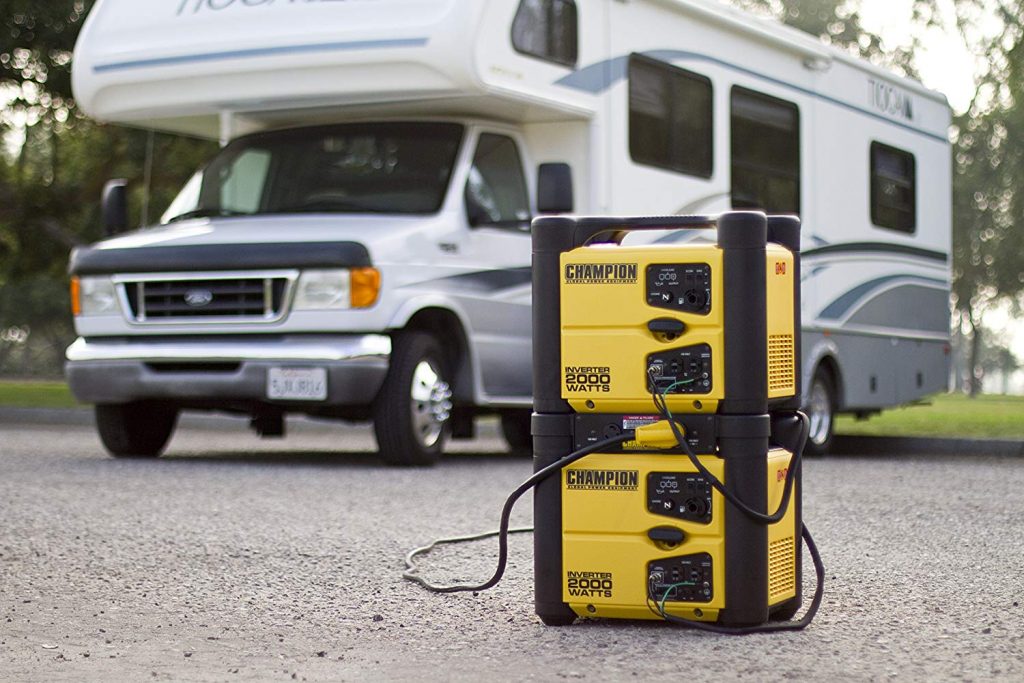

Many brands have begun making 2000 watt inverter generators in the last couple of years to compete in price with Honda and Yamaha.
Of all the less expensive options, Champion has been around the longest (from what I know) and for that reason I include it in this list. They may not be the quietest, run the longest or be the easiest to maintain, however they have a track record and will get the job done.
- Cheapest generator that is still decent quality.
- One cool feature is that if you have two of them, they are designed to be stacked on top of each other. Not really something that seems to matter, but its unique.
- Good reviews and ratings after all these years, so even though it may not be as high quality as the Yamaha or Honda, it is still reliable.
Need More Info?
If you would like to know more specific details like warranty duration, fuel tank sizes, special functions and maintenance procedures (to see which one is easiest to change the oil, etc.) then you can follow the Amazon shop links or watch YouTube videos.
Reach Out Any Time
I hope this information was helpful and saves you some time with trying to figure out what kind and which brand of generator to get.
After a year full-timing in our RV, dozens of hours of research and hanging out with/speaking to a large amount of other full time RVers, these are the generators that they own, recommend or are widely known to be “what you want”.
If you have any questions, please feel free to let us know in the comments below.

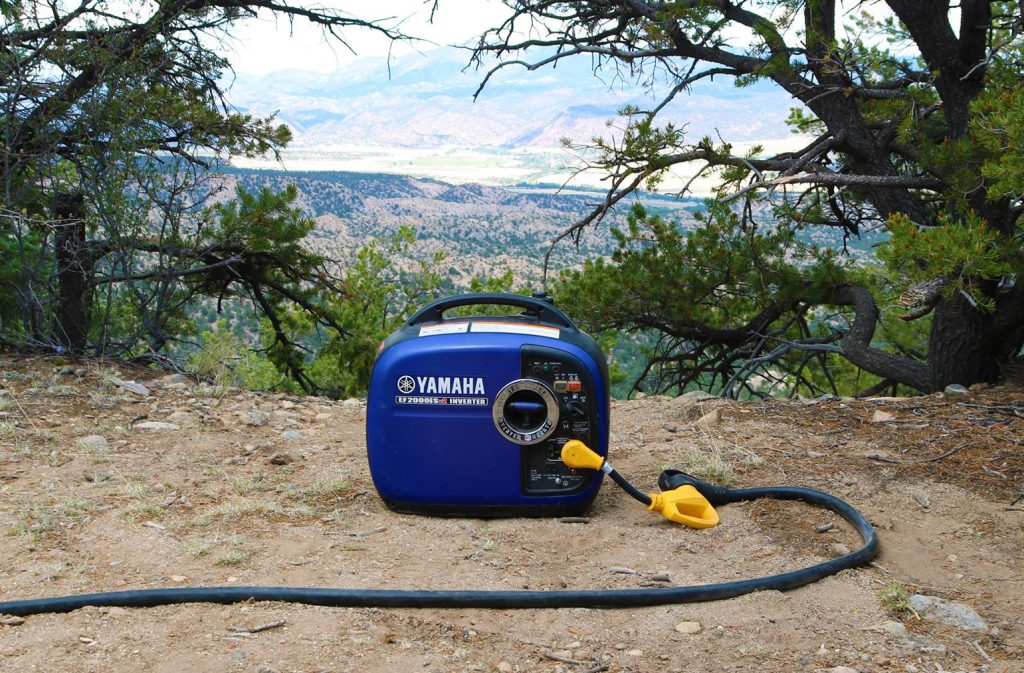
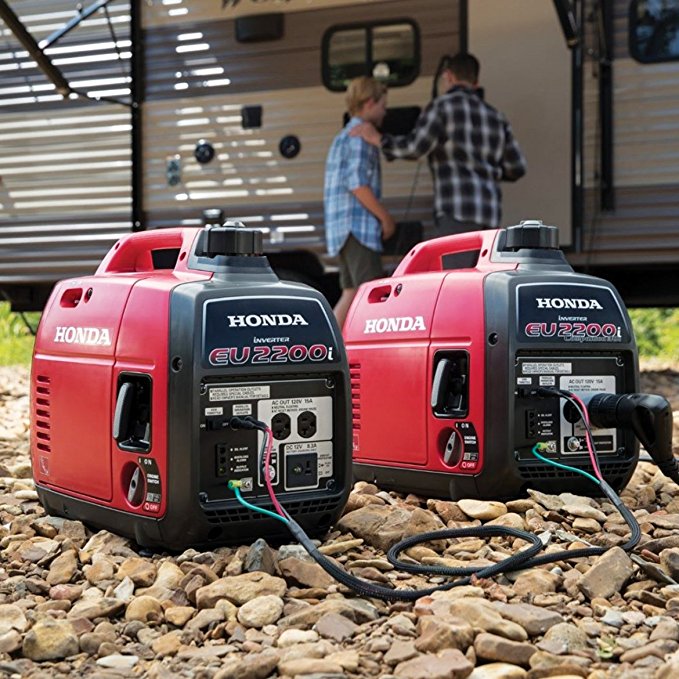
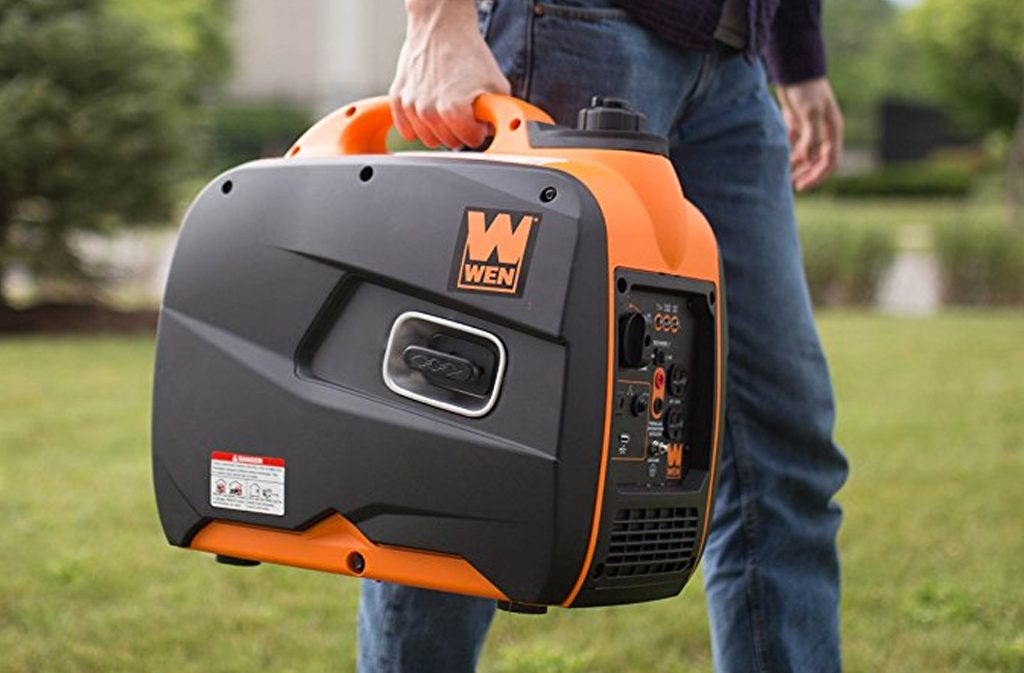



Hi, thank you so much for your detailed review. My fiancé and I are building a container home and the first phase (that we can move in to) won’t be done for about a year. We are planning to live in our travel trailer in the mean time on our land. If you don’t mind, can you please point me in the right direction in terms of the right inverter generator we should purchase for full time usage. I’d really like one as mentioned that only provides roughly the amount of energy that is necessary based on the pull. We are a family of four with 2 two kids ages 13 and 8. Not looking to run air conditioning, just basic household items and iPads, phones, and one TV. I would like to keep the cost as far under $4,000 as possible but I don’t want to run out of power or have to get gas every single day if that can be avoided. Any input would be amazing. The goal is to be moved in by the end of June. Thanks so much, Paula.
What a coinkidink! We just transitioned from living full-time on the road to having a home base and are currently in the process of converting a shipping container too! Will you be documenting yours? I always love watching others do their conversions to get inspired. I’m still raising funds so I wont start for about a month or so.
As far as your question, I’ll get back with you ASAP. My husband actually wrote this blog post so I’ve forwarded it to him. We’ll be in touch shortly!
Ok, here’s his response :)
“Hi Paula, thanks for reaching out. Any of the generators that we have listed in this blog post would be suitable for your power needs.
In terms of “not having to get gas every day” we recommend getting two 5 gallon gas cans that you fill up every once and a while and keep on hand that way you can keep your generator topped off throughout the week.
In terms of which generator is the best, they all perform relatively similarly, but the Yamaha, Honda and WEN brands are the best. The Champion generator is more of a budget generator.
Please let us know if you have any additional questions!”
Thank you, this info was perfect! We’ve decided to purchase the Honda EU7000IS Invertor Generator. We will be documenting the process somewhat but haven’t decided on the platform, nothing major. More so for us just to see progress over time. Thanks again!!!!
If you need to run the AC a Tv,Phone charger, and a couple of lamps what am I needing to look at?
Oh my gosh. I finally found a layman’s article on generators I can understand. Than you from the bottom of my heart for listing everything you can run on your Yamaha generator. You did a great job of convincing me that the Yamaha is the way to go for my smaller 17’ trailer.
You’re so welcome! Happy to help :) Happy trails to you!